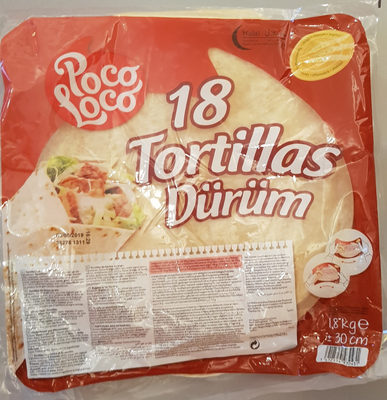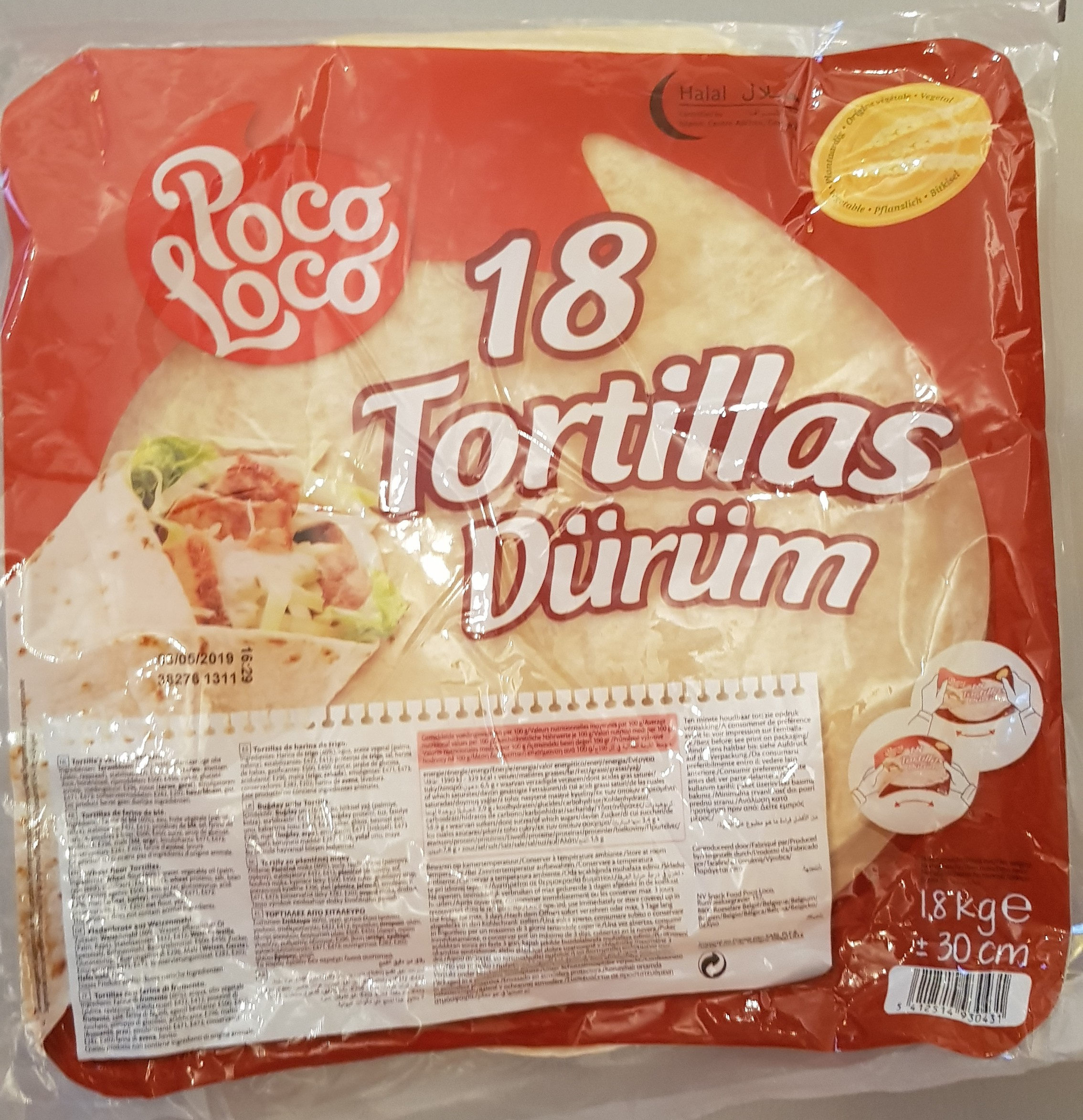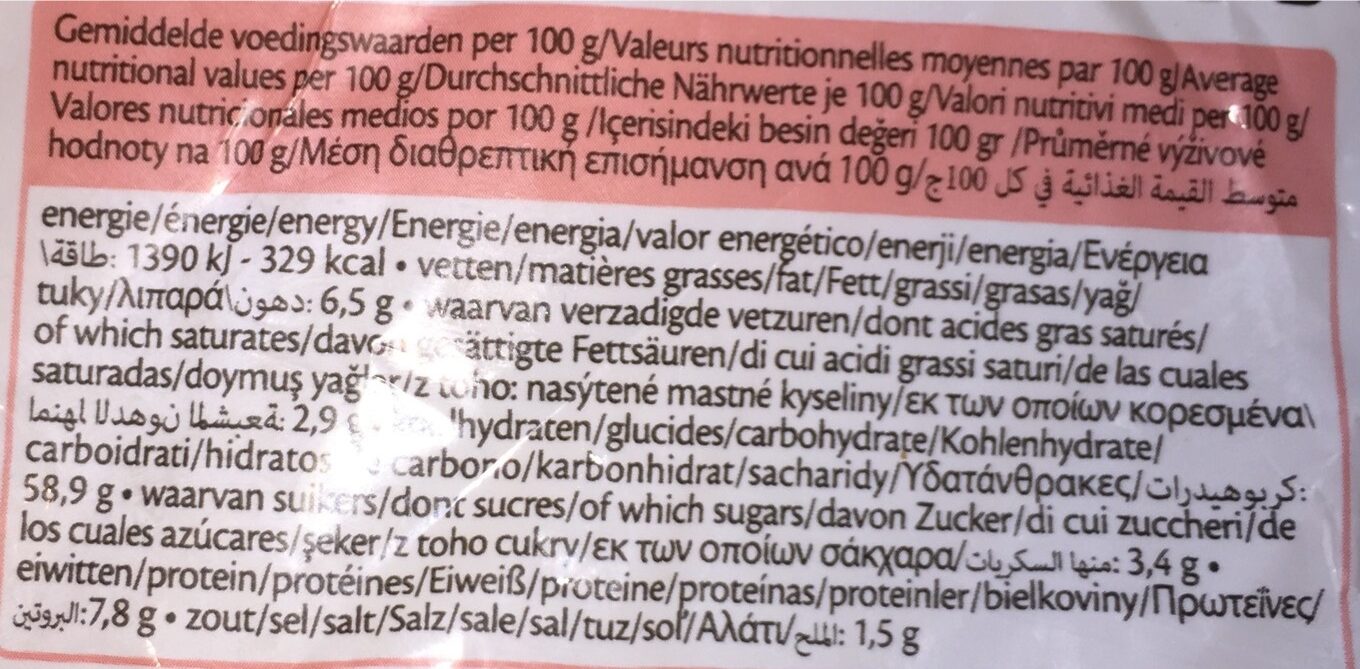Help us make food transparency the norm!
As a non-profit organization, we depend on your donations to continue informing consumers around the world about what they eat.
The food revolution starts with you!
18 tortillas dürüm - Poco Loco - 1.8 kg (18 pièces de 100 g)
18 tortillas dürüm - Poco Loco - 1.8 kg (18 pièces de 100 g)
This product page is not complete. You can help to complete it by editing it and adding more data from the photos we have, or by taking more photos using the app for Android or iPhone/iPad. Thank you!
×
Barcode: 5412514930431 (EAN / EAN-13)
Common name: Tortillas de farine de blé
Quantity: 1.8 kg (18 pièces de 100 g)
Brands: Poco Loco
Categories: Plant-based foods and beverages, Plant-based foods, Cereals and potatoes, Breads, Flatbreads, White breads, Wheat breads, Wheat flatbreads, Pains plats
Labels, certifications, awards:
Halal
Manufacturing or processing places: Belgique
Matching with your preferences
Health
Ingredients
-
28 ingredients
French: Farine de blé, eau, huile végétale (palme, colza), stabilisants : E422, E412; protéines de blé, sel, farine de haricot, poudres à lever ; E500, E450; sucre, sirop de glucose, acidifiant : E296, malt (blé, orge), émulsifiants : E471, E473; conservateurs : E282 E202; farine d'avoine, levure.Allergens: Gluten, fr:avoine, fr:avoine
Food processing
-
Ultra processed foods
Elements that indicate the product is in the 4 - Ultra processed food and drink products group:
- Additive: E412 - Guar gum
- Additive: E422 - Glycerol
- Additive: E450 - Diphosphates
- Additive: E471 - Mono- and diglycerides of fatty acids
- Additive: E473 - Sucrose esters of fatty acids
- Ingredient: Emulsifier
- Ingredient: Glucose
- Ingredient: Glucose syrup
Food products are classified into 4 groups according to their degree of processing:
- Unprocessed or minimally processed foods
- Processed culinary ingredients
- Processed foods
- Ultra processed foods
The determination of the group is based on the category of the product and on the ingredients it contains.
Additives
-
E202 - Potassium sorbate
Potassium sorbate (E202) is a synthetic food preservative commonly used to extend the shelf life of various food products.
It works by inhibiting the growth of molds, yeast, and some bacteria, preventing spoilage. When added to foods, it helps maintain their freshness and quality.
Some studies have shown that when combined with nitrites, potassium sorbate have genotoxic activity in vitro. However, potassium sorbate is generally recognized as safe (GRAS) by regulatory authorities.
-
E282 - Calcium propionate
Calcium propanoate: Calcium propanoate or calcium propionate has the formula Ca-C2H5COO-2. It is the calcium salt of propanoic acid.Source: Wikipedia
-
E296 - Malic acid
Malic acid: Malic acid is an organic compound with the molecular formula C4H6O5. It is a dicarboxylic acid that is made by all living organisms, contributes to the pleasantly sour taste of fruits, and is used as a food additive. Malic acid has two stereoisomeric forms -L- and D-enantiomers-, though only the L-isomer exists naturally. The salts and esters of malic acid are known as malates. The malate anion is an intermediate in the citric acid cycle.Source: Wikipedia
-
E412 - Guar gum
Guar gum (E412) is a natural food additive derived from guar beans.
This white, odorless powder is valued for its remarkable thickening and stabilizing properties, making it a common ingredient in various food products, including sauces, dressings, and ice creams.
When used in moderation, guar gum is considered safe for consumption, with no known adverse health effects.
-
E422 - Glycerol
Glycerol: Glycerol -; also called glycerine or glycerin; see spelling differences- is a simple polyol compound. It is a colorless, odorless, viscous liquid that is sweet-tasting and non-toxic. The glycerol backbone is found in all lipids known as triglycerides. It is widely used in the food industry as a sweetener and humectant and in pharmaceutical formulations. Glycerol has three hydroxyl groups that are responsible for its solubility in water and its hygroscopic nature.Source: Wikipedia
-
E450 - Diphosphates
Diphosphates (E450) are food additives often utilized to modify the texture of products, acting as leavening agents in baking and preventing the coagulation of canned food.
These salts can stabilize whipped cream and are also found in powdered products to maintain their flow properties. They are commonly present in baked goods, processed meats, and soft drinks.
Derived from phosphoric acid, they're part of our daily phosphate intake, which often surpasses recommended levels due to the prevalence of phosphates in processed foods and drinks.
Excessive phosphate consumption is linked to health issues, such as impaired kidney function and weakened bone health. Though diphosphates are generally regarded as safe when consumed within established acceptable daily intakes, it's imperative to monitor overall phosphate consumption to maintain optimal health.
-
E471 - Mono- and diglycerides of fatty acids
Mono- and diglycerides of fatty acids (E471), are food additives commonly used as emulsifiers in various processed foods.
These compounds consist of glycerol molecules linked to one or two fatty acid chains, which help stabilize and blend water and oil-based ingredients. E471 enhances the texture and shelf life of products like margarine, baked goods, and ice cream, ensuring a smooth and consistent texture.
It is generally considered safe for consumption within established regulatory limits.
-
E500 - Sodium carbonates
Sodium carbonates (E500) are compounds commonly used in food preparation as leavening agents, helping baked goods rise by releasing carbon dioxide when they interact with acids.
Often found in baking soda, they regulate the pH of food, preventing it from becoming too acidic or too alkaline. In the culinary world, sodium carbonates can also enhance the texture and structure of foods, such as noodles, by modifying the gluten network.
Generally recognized as safe, sodium carbonates are non-toxic when consumed in typical amounts found in food.
Ingredients analysis
-
Palm oil
Ingredients that contain palm oil: Palm oil
-
Maybe vegan
Ingredients that may not be vegan: E422, E471, E473
-
Maybe vegetarian
Ingredients that may not be vegetarian: E422, E471, E473
-
Details of the analysis of the ingredients
fr: Farine de blé, eau, huile végétale de palme, huile végétale de colza, stabilisants (e422), e412, protéines de blé, sel, haricot, poudres à lever, e500, e450, sucre, sirop de glucose, acidifiant (e296), malt (blé, orge), émulsifiants (e471), e473, conservateurs (e282), e202, farine d'_avoine_, levure- Farine de blé -> en:wheat-flour - vegan: yes - vegetarian: yes - ciqual_proxy_food_code: 9410 - percent_min: 4.54545454545455 - percent_max: 100
- eau -> en:water - vegan: yes - vegetarian: yes - ciqual_food_code: 18066 - percent_min: 0 - percent_max: 50
- huile végétale de palme -> en:palm-oil - vegan: yes - vegetarian: yes - from_palm_oil: yes - ciqual_food_code: 16129 - percent_min: 0 - percent_max: 33.3333333333333
- huile végétale de colza -> en:colza-oil - vegan: yes - vegetarian: yes - from_palm_oil: no - ciqual_food_code: 17130 - percent_min: 0 - percent_max: 25
- stabilisants -> en:stabiliser - percent_min: 0 - percent_max: 20
- e422 -> en:e422 - vegan: maybe - vegetarian: maybe - percent_min: 0 - percent_max: 20
- e412 -> en:e412 - vegan: yes - vegetarian: yes - percent_min: 0 - percent_max: 16.6666666666667
- protéines de blé -> en:wheat-protein - vegan: yes - vegetarian: yes - percent_min: 0 - percent_max: 14.2857142857143
- sel -> en:salt - vegan: yes - vegetarian: yes - ciqual_food_code: 11058 - percent_min: 0 - percent_max: 1.475
- haricot -> en:beans - vegan: yes - vegetarian: yes - percent_min: 0 - percent_max: 1.475
- poudres à lever -> en:raising-agent - percent_min: 0 - percent_max: 1.475
- e500 -> en:e500 - vegan: yes - vegetarian: yes - percent_min: 0 - percent_max: 1.475
- e450 -> en:e450 - vegan: yes - vegetarian: yes - percent_min: 0 - percent_max: 1.475
- sucre -> en:sugar - vegan: yes - vegetarian: yes - ciqual_proxy_food_code: 31016 - percent_min: 0 - percent_max: 1.475
- sirop de glucose -> en:glucose-syrup - vegan: yes - vegetarian: yes - ciqual_proxy_food_code: 31016 - percent_min: 0 - percent_max: 1.475
- acidifiant -> en:acid - percent_min: 0 - percent_max: 1.475
- e296 -> en:e296 - vegan: yes - vegetarian: yes - percent_min: 0 - percent_max: 1.475
- malt -> en:malt - vegan: yes - vegetarian: yes - percent_min: 0 - percent_max: 1.475
- blé -> en:wheat - vegan: yes - vegetarian: yes - ciqual_proxy_food_code: 9410 - percent_min: 0 - percent_max: 1.475
- orge -> en:barley - vegan: yes - vegetarian: yes - percent_min: 0 - percent_max: 0.7375
- émulsifiants -> en:emulsifier - percent_min: 0 - percent_max: 1.475
- e471 -> en:e471 - vegan: maybe - vegetarian: maybe - from_palm_oil: maybe - percent_min: 0 - percent_max: 1.475
- e473 -> en:e473 - vegan: maybe - vegetarian: maybe - percent_min: 0 - percent_max: 1.475
- conservateurs -> en:preservative - percent_min: 0 - percent_max: 1.475
- e282 -> en:e282 - vegan: yes - vegetarian: yes - percent_min: 0 - percent_max: 1.475
- e202 -> en:e202 - vegan: yes - vegetarian: yes - percent_min: 0 - percent_max: 1.475
- farine d'_avoine_ -> en:oat-flour - vegan: yes - vegetarian: yes - ciqual_food_code: 9310 - percent_min: 0 - percent_max: 1.475
- levure -> en:yeast - vegan: yes - vegetarian: yes - percent_min: 0 - percent_max: 1.475
Nutrition
-
Poor nutritional quality
⚠ ️Warning: the amount of fiber is not specified, their possible positive contribution to the grade could not be taken into account.⚠ ️Warning: the amount of fruits, vegetables and nuts is not specified on the label, it was estimated from the list of ingredients: 5This product is not considered a beverage for the calculation of the Nutri-Score.
Positive points: 0
- Proteins: 4 / 5 (value: 7.8, rounded value: 7.8)
- Fiber: 0 / 5 (value: 0, rounded value: 0)
- Fruits, vegetables, nuts, and colza/walnut/olive oils: 0 / 5 (value: 5.96590909090909, rounded value: 6)
Negative points: 12
- Energy: 4 / 10 (value: 1390, rounded value: 1390)
- Sugars: 0 / 10 (value: 3.4, rounded value: 3.4)
- Saturated fat: 2 / 10 (value: 2.9, rounded value: 2.9)
- Sodium: 6 / 10 (value: 590, rounded value: 590)
The points for proteins are not counted because the negative points are greater or equal to 11.
Nutritional score: (12 - 0)
Nutri-Score:
-
Nutrient levels
-
Fat in moderate quantity (6.5%)
What you need to know- A high consumption of fat, especially saturated fats, can raise cholesterol, which increases the risk of heart diseases.
Recommendation: Limit the consumption of fat and saturated fat- Choose products with lower fat and saturated fat content.
-
Saturated fat in moderate quantity (2.9%)
What you need to know- A high consumption of fat, especially saturated fats, can raise cholesterol, which increases the risk of heart diseases.
Recommendation: Limit the consumption of fat and saturated fat- Choose products with lower fat and saturated fat content.
-
Sugars in low quantity (3.4%)
What you need to know- A high consumption of sugar can cause weight gain and tooth decay. It also augments the risk of type 2 diabetes and cardio-vascular diseases.
Recommendation: Limit the consumption of sugar and sugary drinks- Sugary drinks (such as sodas, fruit beverages, and fruit juices and nectars) should be limited as much as possible (no more than 1 glass a day).
- Choose products with lower sugar content and reduce the consumption of products with added sugars.
-
Salt in moderate quantity (1.48%)
What you need to know- A high consumption of salt (or sodium) can cause raised blood pressure, which can increase the risk of heart disease and stroke.
- Many people who have high blood pressure do not know it, as there are often no symptoms.
- Most people consume too much salt (on average 9 to 12 grams per day), around twice the recommended maximum level of intake.
Recommendation: Limit the consumption of salt and salted food- Reduce the quantity of salt used when cooking, and don't salt again at the table.
- Limit the consumption of salty snacks and choose products with lower salt content.
-
-
Nutrition facts
Nutrition facts As sold
for 100 g / 100 mlAs sold
per serving (100g)Compared to: Wheat flatbreads Energy 1,390 kj
(329 kcal)1,390 kj
(329 kcal)+10% Fat 6.5 g 6.5 g -2% Saturated fat 2.9 g 2.9 g +80% Carbohydrates 58.9 g 58.9 g +17% Sugars 3.4 g 3.4 g +42% Fiber ? ? Proteins 7.8 g 7.8 g -8% Salt 1.475 g 1.48 g +20% Fruits‚ vegetables‚ nuts and rapeseed‚ walnut and olive oils (estimate from ingredients list analysis) 5.966 % 5.966 %
Environment
-
Eco-Score B - Low environmental impact
⚠ ️Select a country in order to include the full impact of transportation.The Eco-Score is an experimental score that summarizes the environmental impacts of food products.→ The Eco-Score was initially developped for France and it is being extended to other European countries. The Eco-Score formula is subject to change as it is regularly improved to make it more precise and better suited to each country.Life cycle analysis
-
Average impact of products of the same category: A (Score: 93/100)
Category: Wheat tortilla wrap, to be filled
Category: Wheat tortilla wrap, to be filled
- PEF environmental score: 0.16 (the lower the score, the lower the impact)
- including impact on climate change: 1.20 kg CO2 eq/kg of product
Stage Impact Agriculture
54.7 %Processing
23.7 %Packaging
14.5 %Transportation
6.6 %Distribution
0.5 %Consumption
0.0 %
Bonuses and maluses
-
Missing origins of ingredients information
Malus: -5
⚠ ️ The origins of the ingredients of this product are not indicated.
If they are indicated on the packaging, you can modify the product sheet and add them.
If you are the manufacturer of this product, you can send us the information with our free platform for producers.
-
Ingredients that threatens species
Malus: -10
Contains palm oil
Tropical forests in Asia, Africa and Latin America are destroyed to create and expand oil palm tree plantations. The deforestation contributes to climate change, and it endangers species such as the orangutan, the pigmy elephant and the Sumatran rhino.
-
Packaging with a medium impact
Malus: -10
Shape Material Recycling Impact Bag Plastic High
Eco-Score for this product
-
Impact for this product: B (Score: 68/100)
Product: 18 tortillas dürüm - Poco Loco - 1.8 kg (18 pièces de 100 g)
Life cycle analysis score: 93
Sum of bonuses and maluses: -25
Final score: 68/100
-
Carbon footprint
-
Equal to driving 0.6 km in a petrol car
120 g CO² per 100g of product
The carbon emission figure comes from ADEME's Agribalyse database, for the category: Wheat tortilla wrap, to be filled (Source: ADEME Agribalyse Database)
Stage Impact Agriculture
48.0 %Processing
17.1 %Packaging
23.5 %Transportation
11.0 %Distribution
0.4 %Consumption
0.0 %
Packaging
-
Packaging with a medium impact
-
Packaging parts
Bag (Plastic)
-
Packaging materials
Material % Packaging weight Packaging weight per 100 g of product Plastic
-
Transportation
-
Origins of ingredients
Missing origins of ingredients information
⚠ ️ The origins of the ingredients of this product are not indicated.
If they are indicated on the packaging, you can modify the product sheet and add them.
If you are the manufacturer of this product, you can send us the information with our free platform for producers.Add the origins of ingredients for this product Add the origins of ingredients for this product
Threatened species
-
Contains palm oil
Drives deforestation and threatens species such as the orangutan
Tropical forests in Asia, Africa and Latin America are destroyed to create and expand oil palm tree plantations. The deforestation contributes to climate change, and it endangers species such as the orangutan, the pigmy elephant and the Sumatran rhino.
Report a problem
-
Incomplete or incorrect information?
Category, labels, ingredients, allergens, nutritional information, photos etc.
If the information does not match the information on the packaging, please complete or correct it. Open Food Facts is a collaborative database, and every contribution is useful for all.
Data sources
Product added on by kiliweb
Last edit of product page on by guezguez-majed.
Product page also edited by autorotate-bot, big-brother, elcoco, halal-app-chakib, krusty, musarana, openfoodfacts-contributors, packbot, roboto-app, tacite, thaialagata, yuka.A5lNZfGuJOgbHvfA1YMx2BriBOv8OcVIOUwVoQ, yuka.UKxBZ9SPOfAHJd319p8l_GOVCbflEu1YRlRUog, yuka.V2ZrZ0FvWTV1dm9Xc3NBaDlVdlE4WUpxLzVHN1pXT3RCdElLSWc9PQ.










